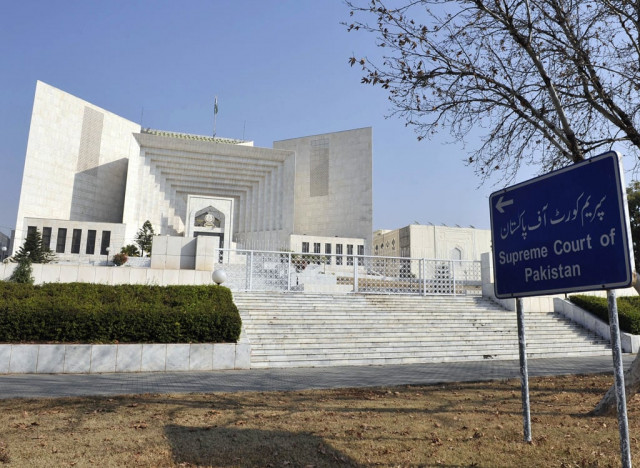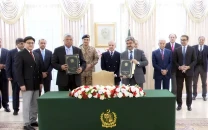Katas Raj Temple case: SC forms committee to probe cement plants' water use
CJP warns of strict actions if any criminality found

Supreme Court of Pakistan. PHOTO: AFP
The three-judge bench, headed by Chief Justice of Pakistan Mian Saqib Nisar, resumed the hearing of a case regarding the dried up pond of Katas Raj Temple due to massive commercial water utilisation by factories located in Kallar Kahar, Punjab.
According to a court notification, the committee would be headed by Human Rights Director General Saleem Rana and comprise Environmental Protection Agency DG Farzana Altaf Shah, while the Additional Registrar Administration Khawaja Daud had been appointed as the focal person.
The bench also made it clear that on the input of the Punjab Anti-Corruption Department, criminal proceedings against DG Khan Cement CEO Muhammad Raza Mansha, son of business tycoon Mian Mansha, and the Bestway Cement CEO had been quashed; however, they would face civil liabilities.
The court allowed the committee, if deemed appropriate, to hire the services of engineers for the purpose of assistance in inspection.
The committee would determine the number of operational tube wells and how much of them were dismantled. It would also examine the capacity of reservoirs of cement factories for storage of water and the current quantity.
The committee would find out whether the factories paid the amount in favour of the government for utilisation of water so far.
The committee would also determine whether the water currently stored in reservoirs is of rain or from underground extraction.
The committee has been directed to start its work from Thursday (today).
The bench ruled that a case would immediately be registered against those who would not cooperate with the committee.
Representing the DG Khan Cement, Salman Aslam Butt advocate informed the bench that the factory had shut down the tube wells.
He also explained how the factory was managing the water for operations of the cement factory.
Civil society representative Waseem Raja informed the bench that the factories had installed reservoirs and met the water demand through tube wells installed at different locations.
Chakwal deputy commissioner (DC) submitted his report stating that all tube wells had been made non-functional, but he was unable to respond when the chief justice asked as to how many tube wells had been closed.
CJP Nisar observed that the DC appeared in the case without preparation.
“You should have known every figure in the matter,” the chief justice observed, questioning as to whether the representatives of civil society were taken along while visiting the factories. The Chakwal DC responded in negation.
The chief justice expressed displeasure and asked as to why the representatives were not taken during the visit to factories. “You have not done the things which you should have,” Nisar told the DC.
On cement factories reserving water in their tanks for four months’ usage, the CJP inquired as to how such a huge quantity of water was conserved.
He further observed that the cement factories were carrying out the same practice which the court had ordered to stop.
Referring to DG Khan Cement CEO Mansha, the chief justice told Butt that a day ago the court had quashed criminal proceedings against him.
“Whatever you are doing will get you into difficulties,” the chief justice told Butt, adding that he himself would visit the sites if required.
The civil society representative alleged that the cement factories were spreading a nexus of underground pipes and utilising water for commercial purpose on the pretext of domestic use.
However, an official of the cement factory denied the allegations, saying they have conserved rainwater in reservoirs.
Justice Ijazul Ahsan, a member of the bench, observed that record of the Metrological Department be sought. The Chakwal DC informed that he had the Metrologic Department’s record.
The DC recalled the figures of closed tube wells and informed the bench that 12 tube wells had been shut down.
However, the civil society representative contended that he himself had highlighted 18 operational tube wells.
“We will examine everything and you will face the music if we find any criminality,” the chief justice told the counsel for factories.



















COMMENTS
Comments are moderated and generally will be posted if they are on-topic and not abusive.
For more information, please see our Comments FAQ